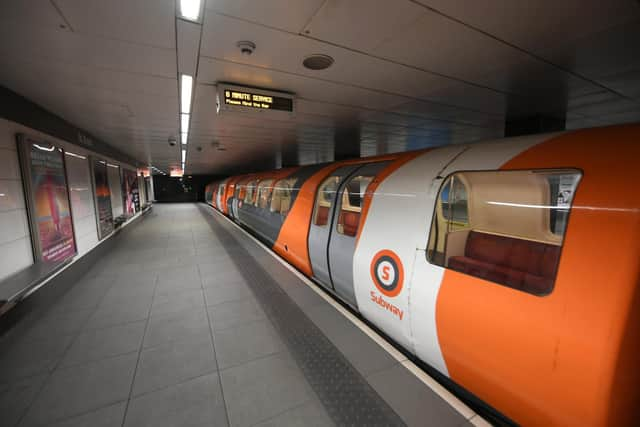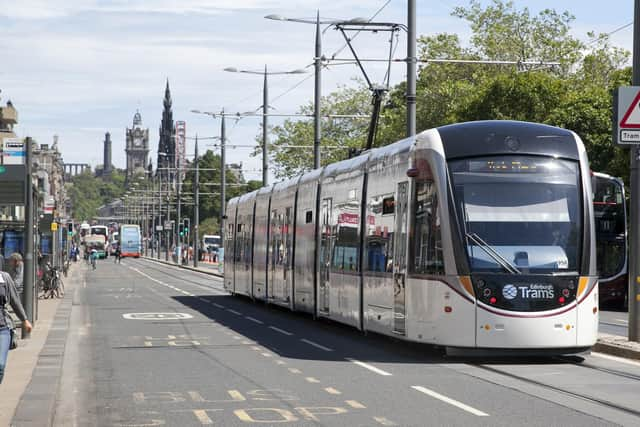Fares rise warning after Glasgow Subway faces passenger loss from free bus travel for under 22s from January
and live on Freeview channel 276
Strathclyde Partnership for Transport (SPT), which operates the underground railway, had urged the move to avert expected losses of £3 million a year as younger passengers switch to buses.
It has joined forces with Edinburgh Trams’ parent body Transport for Edinburgh (TfE) to seek both systems’ inclusion in the scheme.
Advertisement
Hide AdAdvertisement
Hide AdHowever, Transport Scotland said free Subway and tram travel would be for local authorities or regional transport partnerships to fund.


TfE said the trams were expected to initially lose more than £1.5m a year, rising to £3m by 2023, because of the loss of younger passengers.
It has not said whether fares might have to rise.
SPT said it expected a “large number” of the two million plus Subway passengers aged under 22 to switch to buses to take advantage of free travel from January 31.
It said the losses caused could amount to 15 per cent of the Subway’s ticket revenue.


Advertisement
Hide AdAdvertisement
Hide AdSPT chair Dr Martin Bartos said: “We strongly believe such schemes should be extended to cover travel on both Glasgow Subway and Edinburgh Trams.
“The Subway provides direct access to seven Scottish higher and further education institutions in Glasgow.
"That’s 108,000 students enrolled at institutions within the Subway catchment – nearly one fifth of all enrolments across Scotland.
“As well as leading to significant spikes in seating demand for short surface transport journeys – normally soaked up by Subway’s fast mass transit capacity – this government investment could paradoxically lead to SPT and its partner local authorities facing up to £3m losses per annum in revenue.
Advertisement
Hide AdAdvertisement
Hide Ad"I expect those losses would have to be made up from other public funds, service cuts or price rises.”
Transport for Edinburgh chief executive George Lowder said: “Our concerns relate to the loss of annual revenue in the region of £1.5m for the 11 months of 2022, an estimate that will grow in line with patronage recovery, coupled with the added pressure on the bus network if under 22 concessions are not available on trams.
"The financial impact of this will be further compounded when Edinburgh Trams begin operations on the completed line to Newhaven in mid-2023.
“The annual revenue loss attributed to this policy is then expected to rise above £3m per annum."
Advertisement
Hide AdAdvertisement
Hide AdAdam McVey, the SNP leader of Edinburgh City Council, said: “Free bus travel for people under 22 is a fantastic policy and a huge achievement by the SNP in government, but there is a need in cities like Edinburgh and Glasgow, where tram and Subway are important parts of the transport network, to expand this policy.
"The analysis we’ve done shows the cost of doing this is unaffordable for us as a council trying to fund it alone."
However, a Transport Scotland spokesperson said: “The new statutory nationwide scheme is for bus travel only, in the same way as the existing older and disabled persons free bus scheme.
"There are separate local concessionary schemes that are run by local authorities or regional transport partnerships that cover other modes of transport.
Advertisement
Hide AdAdvertisement
Hide Ad"Any decision to extend concessions to these modes rests with them.”
A message from the Editor:
Thank you for reading this article. We're more reliant on your support than ever as the shift in consumer habits brought about by Coronavirus impacts our advertisers.
If you haven't already, please consider supporting our trusted, fact-checked journalism by taking out a digital subscription.
Comment Guidelines
National World encourages reader discussion on our stories. User feedback, insights and back-and-forth exchanges add a rich layer of context to reporting. Please review our Community Guidelines before commenting.
